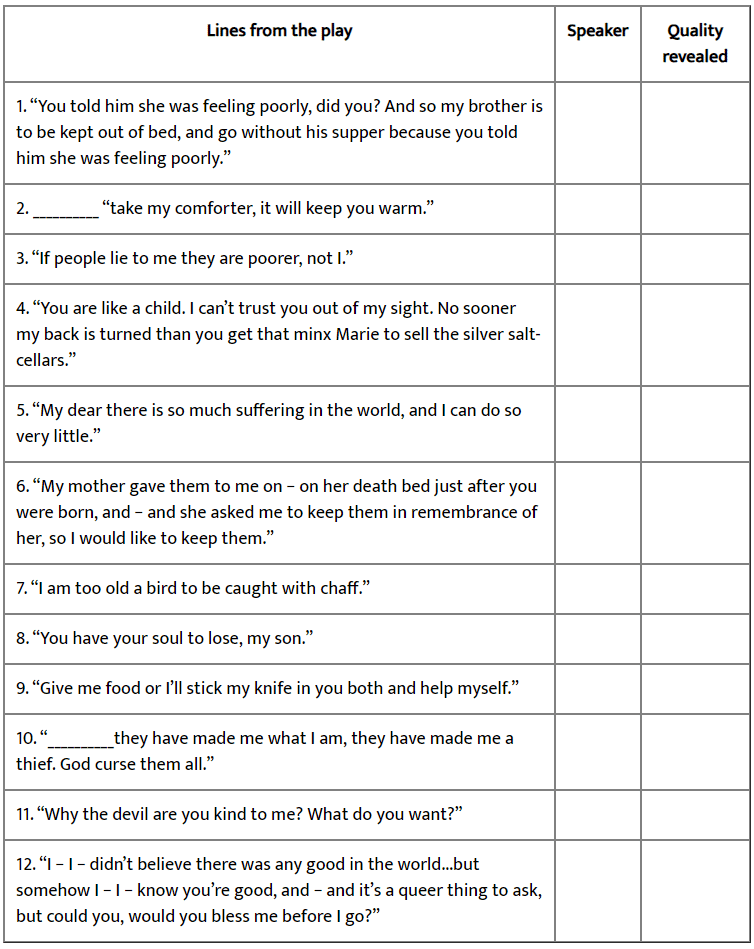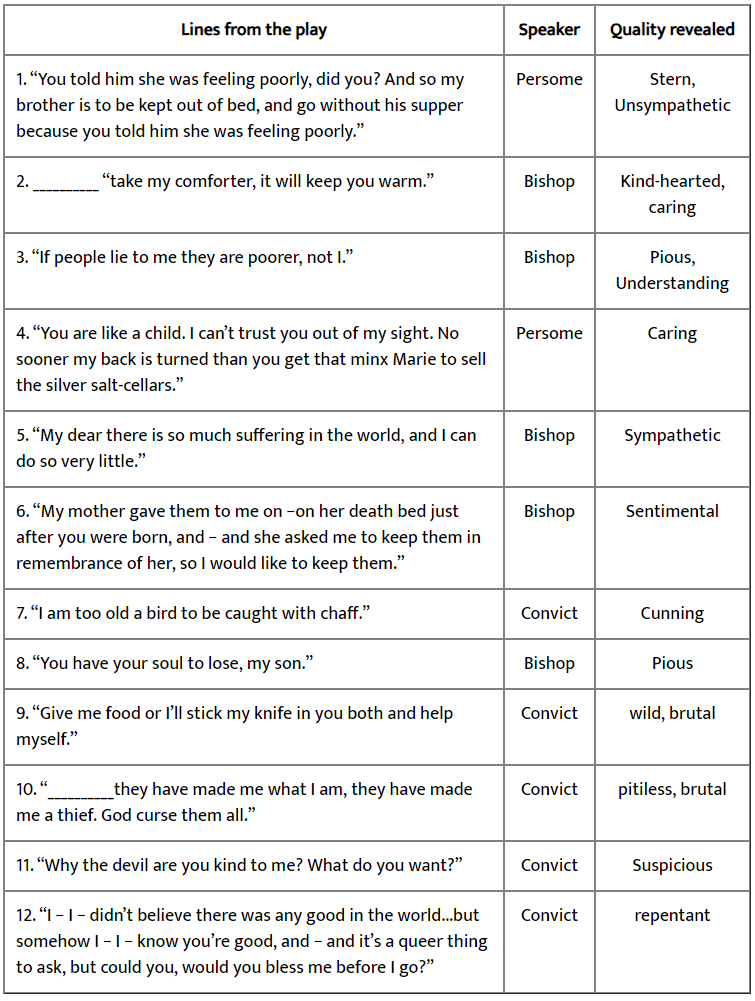NCERT Solutions for Class 9 English - The Bishop’s Candlesticks
Q1: Copy and complete the following paragraph about the theme of the play in pairs:
The play deals with a _______and _______ Bishop who is always
ready to lend a ________hand to anyone in distress. A _______
breaks into the Bishop’s house and is ________ and warmed. The benevolence of the Bishop somewhat
_______the convict, but, when he
sees the silver candlesticks, he _______ them, and runs away. However, he is _______ and brought back. He expects to go back to jail, but the Bishop informs the police they are a _______. The convict is _______ by this kindness of the Bishop and before he leaves he seeks the priest’s blessing.
Ans: The play deals with a kind and charitable Bishop who is always ready to lend a helping hand to anyone in distress. A convict breaks into the Bishop’s house and is fed and warmed. The benevolence of the Bishop somewhat confounds the convict, but, when he sees the silver candlesticks, he steals them, and runs away. However, he is arrested and brought back. He expects to go back to jail, but the Bishop informs the police they are a gift. The convict is moved by this kindness of the Bishop and before he leaves he seeks the priest’s blessing.
Q2: (a) Working in pairs give antonyms of the following words:

Ans:
(i) Kind-hearted − nasty, unkind, cruel
(ii) Unscrupulous −ethical, moral, good
(iii) Forgiving − censure, charge, punish
(iv) Stern − cheerful, funny, lenient
(v) Benevolent −greedy, malevolent, mean, selfish
(vi) Credulous −skeptical, suspecting, suspicious
(vii) Generous − greedy, mean, miserly
(viii) Pious -atheist, impious, irreligious
(ix) Suspicious −innocent, trustworthy, trusty
(x) Sympathetic −callous, merciless, uncaring, unconcerned
(xi) Understanding − misunderstanding, intolerant
(xii) Wild − civilized, controlled, delicate, gentle
(xiii) Innocent − bad, blamable, corrupt
(xiv) Penitent − happy, unashamed
(xv) Clever − awkward, foolish, idiotic, ignorant,
(xvi) Brutal −generous, humane, kind, nice
(xvii) Cunning −gullible, kind, naive
(xviii) Caring −disregarding, ignoring, neglecting
(xix) Sentimental − hard-hearted, indifferent, pragmatic, unemotional
(xx) Trusting-disagree, dispute, reject, renounce
(xxi) Protective −attacking, harmful, hurtful, injurious
(xxii) Concerned −happy, undisturbed, unperturbed
(xxiii) Honourable − not respectful, unhonourable
(xiv) Embittered −pleasant, content, genial
(b) Select words from the above box to describe the characters in the play as revealed by the following lines from the play.

Ans:

Q3: Answer the following questions briefly
(a) Do you think the Bishop was right in selling the salt-cellars? Why/why not?
Ans: Yes, the Bishop was right in selling the salt-cellars because he was an ideal person. He could not bear the thought of an old and sick lady to be thrown out of the house due to non-payment of rent. He always helps people in times of need.
(b) Why does Persome feel the people pretend to be sick?
Ans: Persome felt that people pretended to be sick to take undue advantage of the Bishop. She was of very protective nature and pained to see that the entire humanity is turning upon them for charity and kindness.
(c) Who was Jeanette? What was the cause of her death?
Ans: Jeanette was the wife of the convict. She died due to illness and starvation.
(d) The convict says, “I am too old a bird to be caught with chaff.” What does he mean by this statement?
Ans: The convict meant that he has is experienced so that he couldn't be misleaded. He ordered the Bishop to stay put because he couldn’t trust anyone not to report to the police and get him arrested.
(e) Why was the convict sent to prison? What was the punishment given to him?
Ans: The convict was sent to prison for stealing a loaf of bread. He was sentenced to ten years in a prison hulk.
(f) Do you think the punishment given to the convict was justified? Why/ why not? Why is the convict eager to reach Paris?
Ans: The punishment given to the convict was not justified. It is too inhuman for someone who was caught stealing just to feed his sick wife. He was guilty of stealing only to feed his wife who was dying of starvation. But they showed him no mercy and treated him like a beast. They chained him like a wild animal, lashed him like a hound and fed him filth. He was covered with vermin and had to sleep on boards. This kind of treatment is inhuman and not justified.
The convict is eager to reach Paris because it was a big city and the Police would never be able to find him there.
(g) Before leaving, the convict asks the Bishop to bless him. What brought about this change in him?
Ans: The Bishop’s benevolent, kind and caring attitude had brought about a change in the convict. That is why before leaving for Paris, he asks the Bishop to bless him.
Q4: Read the following extract and answer the questions that follow by choosing the
correct options.
(a) Why does Persome not complete the sentence?
(i) she used to stammer while speaking.
(ii) she was about to praise the Bishop.
(iii) she did not wish to criticise the Bishop in front of Marie.
(iv) she had a habit of passing such remarks.
(b) Why is she angry with the Bishop?
(i) The Bishop has sold her salt-cellars.
(ii) The Bishop has gone to visit Mere Gringoire.
(iii) He showed extra concern for Marie.
(iv) She disliked the Bishop.
Ans: (i) The Bishop has sold her salt-cellars.
B. ‘She sent little Jean to Monseigneur to ask for help, and—’
(a) Who sent little Jean to the Bishop?
(i) Mere Gringoire
(ii) Marie
(iii) Persome
(iv) Marie's mother
Ans: (i) Mere Gringoire
(b) Why did she send Jean to the Bishop?
(i) so that he could pray for her
(ii) as she knew that he was a generous person
(iii) as she was a greedy woman
(iv) as she was a poor woman
Ans: (ii) as she knew that he was a generous person
C. ‘I offered to take her in here for a day or two, but she seemed to think it might distress you.”
The Bishop wanted to take Mere Grngoire in because _________.
(a) The Bishop wanted to take Mere Grngoire in because _________.
(i) she was sick
(ii) she had no money
(iii) she was unable to pay the rent of her house
(iv) she was a close friend of Persome
Ans: (iii) she was unable to pay the rent of her house
(b) Persome would be distressed on Mere Gringoire's being taken in because ________.
(i) she did not want to help anyone
(ii) she felt that Mere Gringoire was taking undue advantage of the Bishop
(iii) she was a self-centred person
(iv) she would be put to a great deal of inconvenience
Ans: (ii) she felt that Mere Gringoire was taking undue advantage of the Bishop
Q5: Identify the situations which be termed as the turning points in the convict's life?
Ans: The Convict, when was caught and brought to the Bishop’s house, was asked to be released by the Bishop saying that he is a friend to him. The Bishop also gives him his mother’s only memory i.e. candle-sticks. This entire incidence makes convict believe that there still exists humanity. This is the turning point in the convict’s life.
|
180 videos|980 docs|124 tests
|
FAQs on NCERT Solutions for Class 9 English - The Bishop’s Candlesticks
| 1. What is the central theme of the story "The Bishop’s Candlesticks"? |  |
| 2. Who are the main characters in the story "The Bishop’s Candlesticks"? |  |
| 3. How does the Bishop's act of kindness impact the Convict in the story? |  |
| 4. What is the significance of the candlesticks in the story "The Bishop’s Candlesticks"? |  |
| 5. How does the story "The Bishop’s Candlesticks" convey a message of hope and redemption? |  |






















